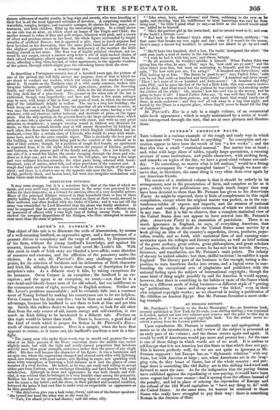LEVER'S ST. PATRICK ' S EVE.
Tan object of this tale is to illustrate the evils of Absenteeism, by means of a well-meaning landlord, an oppressive agent, and a fine specimen of a peasant driven to conspiracy and the verge of murder, by dispossession of his farm, without the young landlord's knowledge, and against his consent, inasmuch as Owen Connor had saved Mr. Leslie's life. With this stock in trade of Irish story are blended a love-affair, some sketches of manners and customs, and the affliction of the peasantry under the cholera. As a tale, St. Patrick's Eve may challenge considerable praise, for its selection of incidents and its delineation of Irish character and Irish life, although there is more than enough of description for de- scription's sake. As a didactic story it fails, by taking exceptions for its instances. Owen Connor is an exception ; the landlord is an ex- ception • and the agent is an exception, we trust,—not that he is a raw-head-and-bloody-bones man of the old school, but too indifferent to the commonest sense of right, according to English notions. Neither are Mr. Lever's positions unassailable ; and he certainly falls into a common error of Young Ireland by making his countrymen out to be too helpless. Owen Connor has his farm rent-free ; but he does not make much of this advantage, because his landlord is not there to look at him and pet him up. Surely this endless desire to lean upon others to look for aid other than from the only source of aid, innate energy and self-exertion, is too much an Irish failing to be inculcated in a didactic tale. Fiction on this topic would be better than truth. There is, however, a good deal of the kind of truth which is proper for fiction in St. Patrick's Eve— truth of character and manners. Here is a sample, when the hero first appears to rescue, as it turns out, his landlord's son from a row in a fair- fight.
The young man who spoke these words was in mould and gesture the very ideal of an Irish peasant of the West; somewhat above the middle size, rather slightly made, but with the light and neatly-turned proportion that betokens activity more than great strength, endurance rather than the power of any single effort. Iiis face well became the character of his,figure: it was a handsome and an Ten one, where the expressions changed and crossed each other with lightning spud, now beaming with good-nature, now flashing in anger, now sparkling with some witty conception, or frowning a bold defiance as it met the glance of some member of a rival faction. He looked, as he was, one ready and willing to accept either part from Fortune, and to exchange friendship and hard knocks with equal satisfaction. Although in dress and appearance he was both cleanly and well- clad, it was evident that he belonged to a very humble class among the peasantry. Neither his hat nor his greatcoat, those unerring signs of competence, had been new for many a day before; and his shoes in their patched and mended condition, betrayed the pains it bad cost him to make even so respectable an appearance as he then presented.
"'She didn'teven give you a look today, Owen,' said one of the former speakers: she turned her head the other way as she went by.' "'Fax, Pm afeard ye've a bad chance,' said the other, slily.
"'Joke away, boys, and welcome,' said Owen, reddening to the eyes as he spoke' and showing that his indifference to their bantenngs was very far from being real; "tis little! mind what ye say,—u little as she herself would mine me,' added he to himself. "'She's the purtiest girl in the town-land, and no second word to it; and even if she hadn't a fortune —' "Bad luck to the fortune! that's what I say,' cried Owen, suddenly: "tis that same that breaks my rest night and day: sure if it wasn't for the money, there's many a decent boy wouldn't be ashamed nor afeard to go up and curt her.'
"'She'll have two hundred, divil a less, I'm tould,' interposed the other: the ould man made a deal of money in the war-time.'
"I wish he had it with him now,' said Owen, bitterly.
"By all accounts, he wouldn't mislike it himself. When Father John war
giving him the rites, he says, says he, 'how ould are ye now ? ' and the other didn't hear him, but went on muttering to himself; and the Priest says agin, ''Tis how ould you are, Pm axing?' lA hundred and forty-three,' says Phil, looking up at him. 'The Saints be good to ns ! ' says Father John; 'sure you 're not that ould—a hundred and forty-three?' 'A hundred and forty-seven.'
Phew ! he's more of it—a hundred and forty-seven!' 'A hundred and fifty,' cries Phil; and he gave the foot of the bed a httle kick, this way--sorra more— and he died. And what was it but the guineas he was countin' in a stocking under- the clothes all the while! Oh, musha ! how his sowl was in the money, and he. going to leave it all ! I heerd Father John say, 'it was well they found it out; for there'd be a curse on them guineas, and every hand that would touch one of them, in seek seclorum': and they wer' all tuk away in a bag that night, and buried by the Priest in a saycret place, where they'll never be found till the Day of Judgment.'" St. Patrick's Eve is a tale in a single volume, of an ornamental table-book appearance ; which is amply maintained by a series of wood- cuts interspersed through the text, that are at once pictures and illustra-. dons.


























 Previous page
Previous page